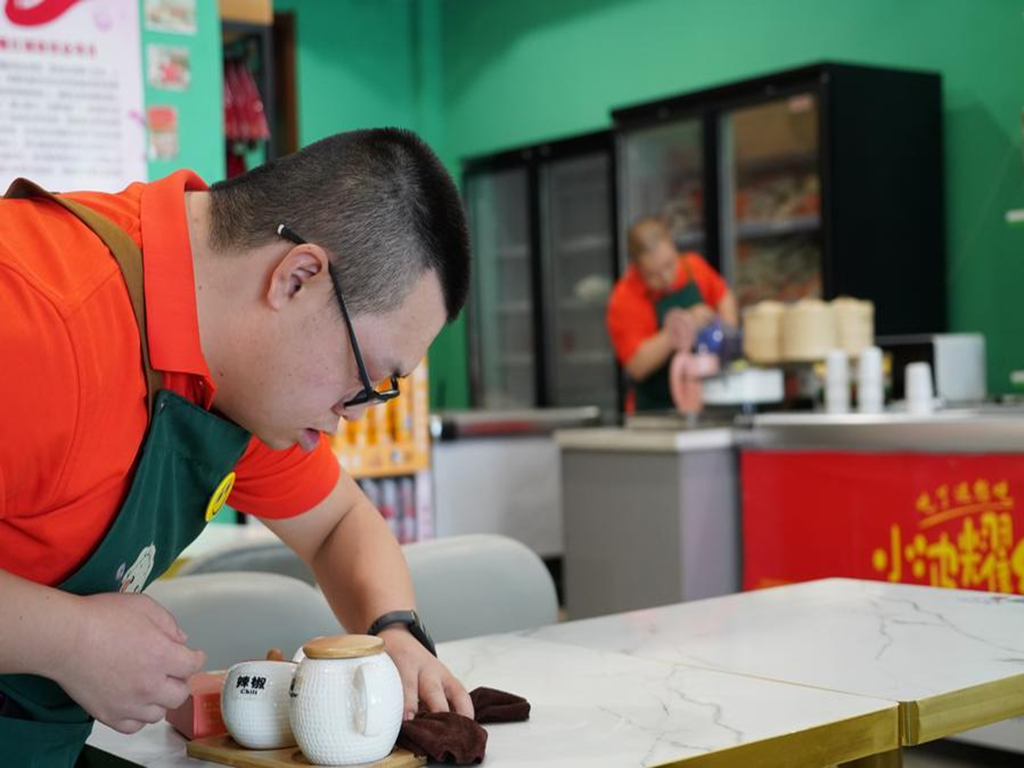Restaurant relies on workers with Down syndrome

On a bustling street in Hohhot, capital of the Inner Mongolia autonomous region, Xiaoboyaohong might seem like just another trendy dumpling restaurant.
But one thing sets it apart from its neighbors: half the workers have Down syndrome.
A genetic condition that causes mild to moderate cognitive disability, developmental delays and physical challenges, Down syndrome occurs when a person is born with an extra chromosome.
People with Down syndrome have long faced limited employment opportunities due to their developmental challenges.
Xiaoboyaohong, founded by Hong Bo, employs staff members with Down syndrome ranging in age from their 20s to their 40s, who work as cashiers, cleaners and chefs, all performing their duties with the same dedication and skill as anyone else.
Hong's journey toward helping people with Down syndrome began at a special birthday party for the son of his friend Bai Ye. The boy and his friends all had Down syndrome, and they impressed Hong with their ability to carry out simple tasks.
"My friend told me that individuals with intellectual disabilities need more opportunities to integrate into society," he said. "However, the job opportunities available to them are limited."
Hong's empathy was also shaped by personal experience. He once lost his vision for eight months due to diabetic complications and only regained it after treatment. That challenge made him deeply aware of the struggles faced by people with disabilities, prompting him to take action.
Drawing on his background in running an agricultural business, Hong opened Xiaoboyaohong on Dec 22, coinciding with the Winter Solstice, a day when dumplings are traditionally eaten in northern China.
He designed a training program for employees with Down syndrome, covering everything from greeting customers to cooking dumplings. The process, however, was far from easy. For his employees, mastering each step required not just patience but hundreds, if not thousands, of repetitions.
Now his restaurant is home to four people with Down syndrome.
Hong's goal goes beyond simply providing jobs; he aims to help his staff members grow into the best versions of themselves, finding both their place in society and a sense of fulfillment in the workplace.
When 23-year-old Zhang Fan, an employee with Down syndrome, first joined the restaurant, he was shy and reserved, rarely speaking to anyone. Today, he is outgoing, greeting customers as they enter and bidding them farewell as they leave.
"I love my job," Zhang said. "It's like being a little bee collecting nectar — work hard, don't slack off, and you'll do it right."
Chen Hao, another employee, had a natural interest in math but struggled to count to 20 when he started. After months of patient training, he has transformed into a skilled cashier.
"Rehabilitation for people with Down syndrome is a lifelong process," said Bai, honorary chairwoman of the association for people with intellectual disabilities and their families in Inner Mongolia. "Every task they complete, whether it's taking an order or interacting with customers, helps improve their abilities."
Inspired by Hong's initiative, Chen Weidong decided to open a Xiaoboyaohong branch in the city of Huairen, Shanxi province, over 200 kilometers from Hohhot.
"I was moved by videos of Hong's restaurant that were shared by my aunt, who is a regular customer there," Chen said.
He has recruited two staff members, one 30 years old and the other 18, both of whom are working for the first time. Once the restaurant officially opens, he plans to hire three or four more.
Xiaoboyaohong now boasts seven franchised branches, and the program has trained 79 people with Down syndrome, 34 of whom have secured permanent employment at various dumpling houses.
"I hope the dumpling restaurant will become more than just a place for employment and rehabilitation for people with Down syndrome," Hong said. "I want it to be a platform where they can pursue and realize their dreams."